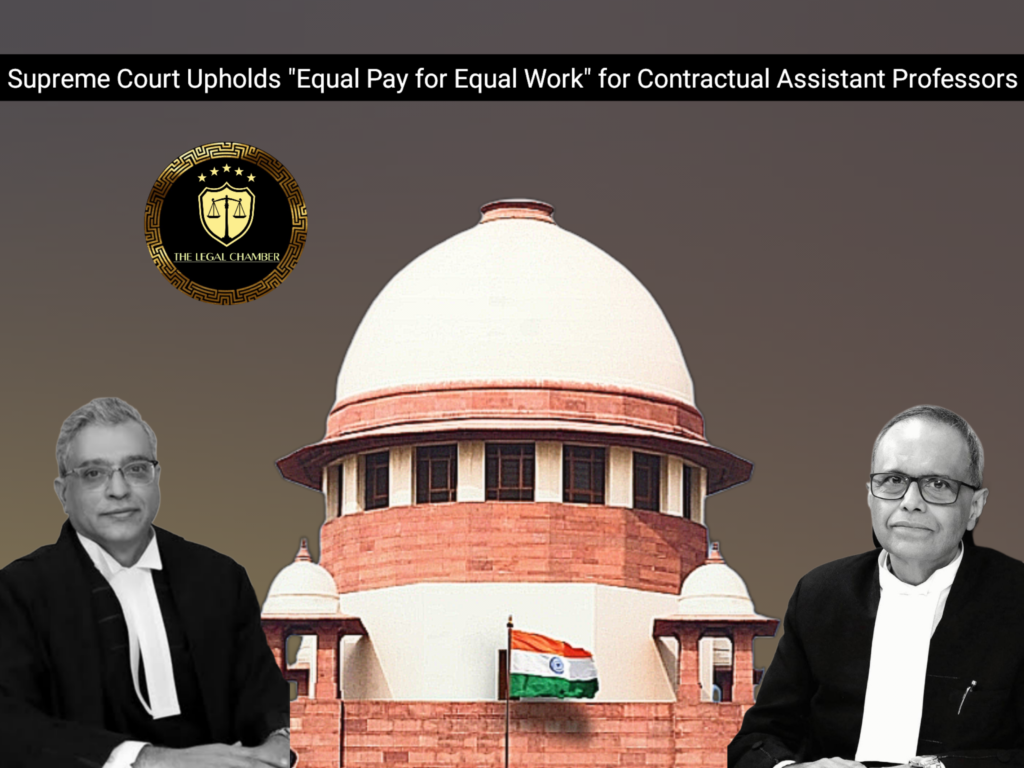
The Supreme Court affirmed the principle of “equal pay for equal work” for contractually appointed Assistant Professors performing identical duties as their regular and ad-hoc counterparts. It directed the State to pay them the minimum of the pay scale applicable to the post, holding that the nature of the appointment (contractual) does not negate the entitlement to pay parity when the work is the same.
Facts Of The Case:
Procedural History:
The procedural history of this case involves multiple rounds of litigation before the Gujarat High Court and the Supreme Court. It commenced with writ petitions filed by contractually appointed Assistant Professors seeking pay parity. A learned Single Judge, in a common order dated September 7, 2016, partly allowed these petitions, directing that the contractual appointees be paid the minimum of the pay scale for Assistant Professors. The State of Gujarat filed Letters Patent Appeals against this decision. In the first batch of cases, a Division Bench of the High Court, in its judgment dated February 14, 2023, dismissed the State’s appeals and upheld the Single Judge’s direction. However, in a subsequent batch involving similarly placed contractual appointees, a different Division Bench, by an order dated December 20, 2023, allowed the State’s appeal and set aside the relief granted by another Single Judge, dismissing the writ petitions altogether. This conflicting outcome from coordinate benches of the High Court led to the filing of special leave petitions before the Supreme Court by both the State (challenging the first Division Bench judgment) and the aggrieved contractual Assistant Professors (challenging the second Division Bench judgment).
READ ALSO:Supreme Court’s Mixed Verdict for a Forest Officer :Right Declared, But Promotion Delayed
Court Observation:
The Supreme Court made strong observations, expressing serious concern over the state’s treatment of teachers who form the intellectual backbone of the nation. The Court categorically held that the principle of “equal pay for equal work” is squarely applicable, as the contractually appointed Assistant Professors performed identical duties and functions to their regular and ad-hoc counterparts, with no distinction pointed out by the State. It observed that paying meagre, stagnant salaries for nearly two decades to highly qualified academicians was egregious and diminished the value placed on education. The Court emphasized that merely reciting respect for teachers at public functions is hollow unless reflected in dignified emoluments. It rejected the State’s contractual appointment argument as a justification for pay disparity, affirming that the nature of appointment does not negate the constitutional entitlement to pay parity when the work is equal. The Court also upheld the grant of arrears with interest as a logical consequence of the restitutionary relief.
Final Decision & Judgement:
The Supreme Court dismissed the State’s appeals and allowed the appeals filed by the contractual Assistant Professors. The Court directed that all similarly placed contractual appointees are entitled to the minimum of the pay scale prescribed for the post of Assistant Professor, applying the principle of ‘equal pay for equal work’. Arrears were to be calculated and paid with 8% simple interest from three years preceding the date of filing of their respective writ petitions. The Court set aside the Division Bench judgment that had outrightly dismissed the petitions, restoring the relief granted by the Single Judge but modifying it to align with the precedent set in earlier cases, thereby granting the minimum pay scale instead of full parity.
Case Details:
Case Title: Shah Samir Bharatbhai & Ors. versus The State of Gujarat & Ors. Citation: 2025 INSC 1026 Civil Appeal No: (Arising out of SLP (C) No. 1347 of 2024) Date of Judgement: August 22, 2025 Judges/Justice Name: Justice Pamidighantam Sri Narasimha and Justice Joymalya Bagchi
Download The Judgement Here